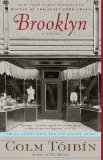Summary | Excerpt | Reviews | Beyond the Book | Readalikes | Genres & Themes | Author Bio

A Novel
by Colm Toibin
"I'm glad it's trifle now," she added, "and not plum pudding and we don't have to worry about keeping it hot."
"Wouldn't you think they'd take off their caps when they are eating?" her sister asked. "Don't they know they're in America?"
"We have no rules here," Father Flood said. "And they can smoke and drink all they like. If we can get them all home safely, that's the main thing. We always have a few a bit too under the weather to go home."
"Too drunk," one Miss Murphy said.
"Ah, on Christmas Day we call it under the weather, and I have a rake of beds made up for them in my own house," Father Flood said.
"What we'll do now is have our own dinner," Miss Murphy said. "And I'll set the table and I've kept a nice dinner for each of us hot and everything."
"Well, I was wondering if we were going to eat at all," Eilis said.
"Poor Eilis. She's starving. Will you look at her?"
"Should we not serve the trifle first?" Eilis asked.
"No, we'll wait," Father Flood said. "It'll stretch the day out."
By the time they were removing the trifle dishes, the hall was a mass of smoke and animated talk. Men sat in groups with one or two standing behind them; others moved from group to group, some with bottles of whiskey in brown paper bags that they passed around. When all the cleaning of the kitchen and the filling of garbage cans had been completed, Father Flood suggested that they go into the hall and join the men for a drink. Some visitors had arrived, including a few women, and Eilis thought, as she sat down with a glass of sherry in her hand, that it could have been a parish hall anywhere in Ireland on the night of a concert or a wedding when the young people were all elsewhere dancing or standing at the bar.
After a while Eilis noticed that two men had taken out fiddlesand another a small accordion; they had found a corner and wereplaying as a few others stood around and listened. Father Floodwas moving about the hall with a notebook now, writing downnames and addresses and nodding as old men spoke to him. Aftera while he clapped his hands and called for silence but it took afew minutes before he could get everyone's attention.
"I don't want to interrupt the proceedings," he said, "but we'd like to thank a nice girl from Enniscorthy and two nice women from Arklow for their hard day's work."
There was a round of applause.
"And, as a way of thanking them, there's one great singer in this hall and we're delighted to see him this year again."
He pointed to the man whom Eilis had mistaken for her father. He was sitting away from Eilis and Father Flood, but he stood up when his name was called and walked quietly towards them. He stood with his back to the wall so that everyone could see him.
"That man," Miss Murphy whispered to Eilis, "has made LPs."
When Eilis looked up the man was signalling to her. He wanted her, it seemed, to come and stand with him. It struck her for a second that he might want her to sing so she shook her head, but he kept beckoning and people began to turn and look at her; she felt that she had no choice but to leave her seat and approach him. She could not think why he wanted her. As she came close she saw how bad his teeth were.
He did not greet her or acknowledge her arrival but closed his eyes and reached his hand towards hers and held it. The skin on the palm of his hand was soft. He gripped her hand tightly and began to move it in a faint circular motion as he started to sing. His voice was loud and strong and nasal; the Irish he sang in, she thought, must be Connemara Irish because she remembered one teacher from Galway in the Mercy Convent who had that accent. He pronounced each word carefully and slowly, building up a wildness, a ferocity, in the way he treated the melody. It was only when he came to the chorus, however, that she understood the words -- "Má bhíonn tú liom, a stóirín mo chroí" -- and he glanced at her proudly, almost possessively, as he sang these lines. All the people in the hall watched him silently. There were five or six verses; he sang the words out with pure innocence and charm so that at times, when he closed his eyes, leaning his large frame against the wall, he did not seem like an old man at all; the strength of his voice and the confidence of his performance had taken over. And then each time he came to the chorus he looked at her, letting the melody become sweeter by slowing down the pace, putting his head down then, managing to suggest even more that he had not merely learned the song but that he meant it. Eilis knew how sorry this man was going to be, and how sorry she would be, when the song had ended, when the last chorus had to be sung and the singer would have to bow to the crowd and go back to his place and give way to another singer as Eilis too went back and sat in her chair.
Copyright © 2009 by Colm Tóibín
Your guide toexceptional books
BookBrowse seeks out and recommends the best in contemporary fiction and nonfiction—books that not only engage and entertain but also deepen our understanding of ourselves and the world around us.